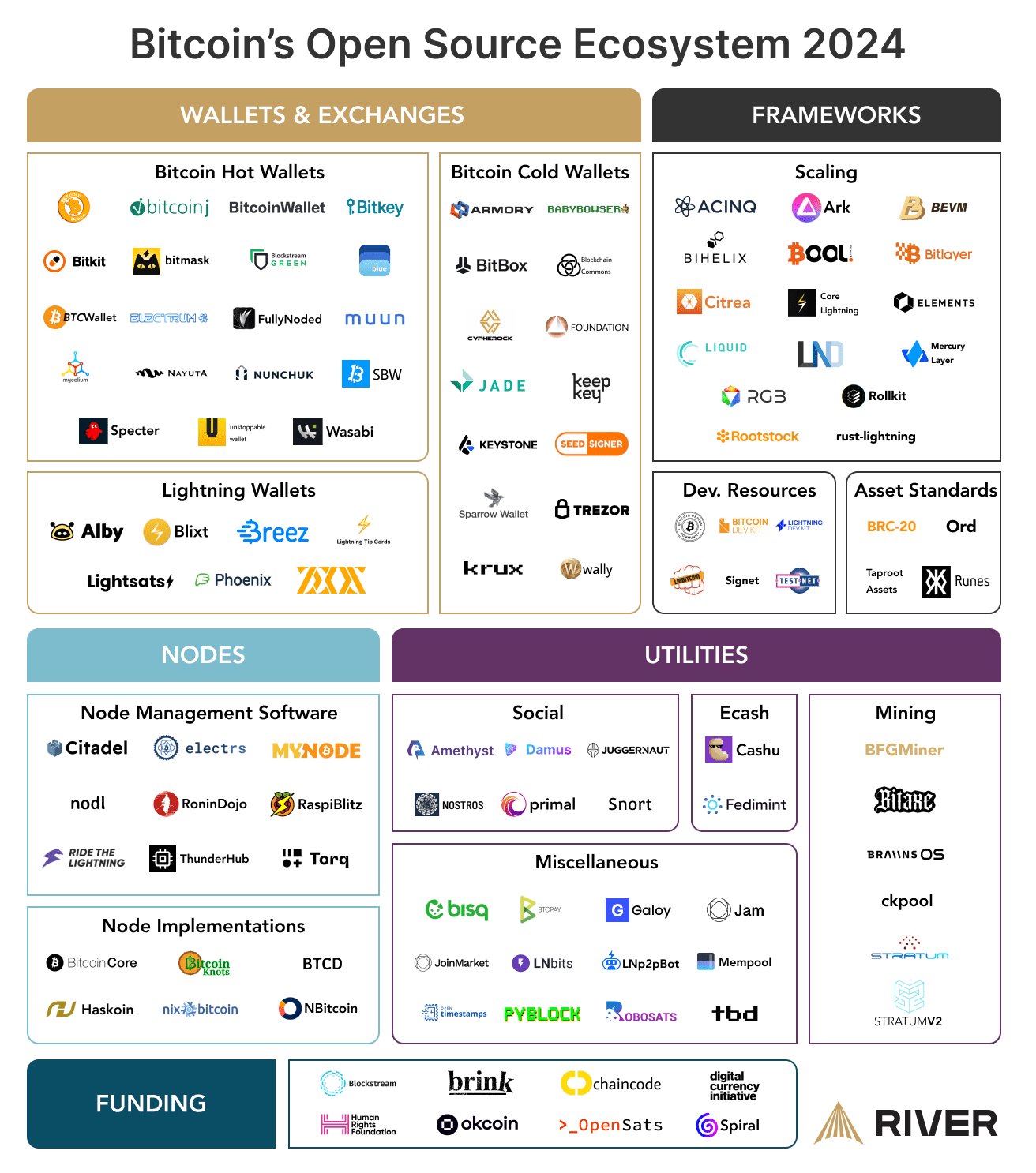Bitcoin’s open and transparent nature sets it apart from other 21st-century technologies. With over 100 million users trusting Bitcoin and related applications with their savings, it’s remarkable that its codebase is entirely open-source, allowing anyone to view, modify, and copy it.
But how is such a system developed and maintained? What value does an open-source financial system offer? In this article, we review the workings of Bitcoin development and explore why transparency is a cornerstone of the Bitcoin ecosystem.
What Is Bitcoin Development?
Bitcoin development encompasses all open-source software within the Bitcoin ecosystem. The primary version of Bitcoin’s software—Bitcoin Core—is open-source, allowing anyone to review, copy, or modify it. We have a separate article dedicated specifically to Bitcoin Core.
Beyond Bitcoin Core, much of the Bitcoin ecosystem follows a similar ethos of transparency and decentralization. This includes wallets, utilities, mining applications, frameworks, and more.
Bitcoin’s open-source development network is vast and constantly evolving. Generally, these projects can be categorized as follows:
- Wallets: Hot wallets, purely software-based, and cold wallets, which typically exist as hardware devices, rely on the highest security standards. Many wallet applications open source their code to allow users to verify their trustworthiness.
- Frameworks: An expanding variety of protocols aim to improve Bitcoin’s scalability or provide adjacent services that complement the Bitcoin network. Frameworks, such as development kits, help developers navigate software development on Bitcoin.
- Mining: Bitcoin mining is a highly specialized industry with unique hardware, software, and enterprise components. For example, Stratum V2 is a new communication protocol for mining pools, allowing miners to efficiently create their own block templates.
- Utilities: A wide variety of applications provide fundamental utilities for node management, social interaction, financial services, and more.
- Funding: Today, many developers are employed by or receive grants from various organizations, foundations, and corporations committed to sustaining Bitcoin’s future. These include Blockstream, Brink, Chaincode Labs, the Human Rights Foundation, MIT’s Digital Currency Initiative, and OpenSats. Importantly, these organizations typically grant developers the freedom to choose what to work on.

What Is the Difference Between Open Source and Closed Source Software?
Most software you interact with today is proprietary, or “closed-source”. Closed-source software is controlled exclusively by a person, company, or organization that maintains a legal monopoly over its access and use. Unlike open-source software, the public is not granted access to the source code. Well-known examples include MacOS, Instagram, and Salesforce.
Why Is It Important for Bitcoin To Be Open-Source?
Bitcoin’s core values of decentralization, security, and permissionless innovation are made possible by its open-source nature. With a codebase accessible to anyone, several benefits follow:
- Decentralization: Tens of thousands of nodes and miners interact with Bitcoin’s code daily, forming a decentralized network resilient to corruption and attacks.
- Security: Bitcoin’s software has been tested, scrutinized, and modified by over 1,000 developers, earning a strong reputation for security and robustness.
- Freedom: Anyone is free to interact with the Bitcoin network and its source code. In the event of a disagreement over Bitcoin’s code, users can fork the codebase to create their own projects.
- Verifiability: Because the code is open, anyone can verify Bitcoin’s underlying software, ensuring trust in the network to safeguard savings and process transactions as expected.
Projects built on top of the Bitcoin network also benefit from an open-sourced approach. For example, scaling solutions like the Lightning Network have similarly accessible codebases and, therefore, reap the same decentralization and security benefits.
How To Get Started in Bitcoin Development
While there is no predefined path to becoming a Bitcoin developer, there are plenty of resources available to help aspiring developers get started.
- The Bitcoin Development Mailing List, Monthly PR Review Club, and Optech Newsletter are great ways to engage with ongoing Bitcoin Core development.
- Bitcoin.org has a webpage dedicated to Bitcoin development, including a list of open-source projects beyond Bitcoin Core.
- Base58, Chaincode Labs, and Mastering Bitcoin are in-depth curriculums for aspiring Bitcoin developers.
- In-person BitDevs meetups are available in many larger cities.
Key Takeaways
- Bitcoin development refers to the development of all open-source software within the Bitcoin ecosystem.
- Open source software is publicly available and licensed such that individuals can use and alter the source code freely.
- Bitcoin’s core values of decentralization, security, and permissionless innovation are made possible because of its open-source nature.


